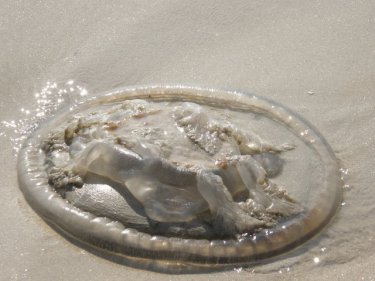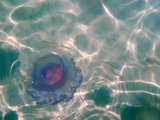The case of Sam Webster, 37, is reported today in Britain's Daily Mail, not just the most popular online news site in that country but the most popular online news site in the world, with millions of readers each day.
Ms Webster says the jellyfish attack took place in Thailand and she tells readers: ''I want to warn others travelling in Thailand so it doesn't happen to them.''
The only Thai tourist destination mentioned in the article is Phuket - although the article makes plain that the stinging incident took place somewhere else, away from Phuket, but reasonably close.
The long headline reads: 'I thought I'd been bitten by a shark': British mother tells of horrific jellyfish stings in Thailand that have left her scarred for life.
The article's accompanying photographs of Ms Webster's leg wounds are alarming. Ms Webster says she needed three months to recover and more than one lengthy operation.
''I'll never be able to wear shorts again and will need skin grafts in the future to help the scarring but knowing what I know now about jellyfish stings I was lucky,'' she told the newspaper.
''I could have died. I won't ever be able to wear shorts or a bikini again. My leg is a mess.''
The article quotes only Ms Webster and does not explain where the incident happened or whether she received appropriate treatment at the time.
Box jellyfish are known to have stung tourists on rare occasions off the Malaysian coast and near Koh Lanta, off Krabi, a neighboring province to Phuket.
Experts recommend dousing a box jellyfish sting with vinegar. The vinegar does not ease the pain, but it does counter the effects of the severely damaging jellyfish toxicity.
Without application of vinegar, a box jellyfish sting can continue to destroy flesh - which is what appears to have happened in Ms Webster's case.
Authorities at most beaches in and around Phuket and across neighboring Phang Nga Bay have been warned to keep vinegar for emergency treatment at all times in case of a rare but potentially deadly box jellyfish strike.
Ms Webster did not specify where she was holidaying in Thailand but she did say that she fell from a banana boat and the stings felt like ''hundreds of razors.''
She was transferred after local treatment to a hospital on Phuket and says she spent the rest of her trip being cared for in the unnamed Phuket hospital.
Since returning to Britain she says she has undergone two operations and faces further skin grafts to repair her leg.
''I am scarred for life but just pleased to be alive and relieved that it wasn't my daughter that got stung,'' she told readers.
''The pain was so bad I honestly thought I had been attacked by a shark. I've been through months of hell since this happened. I never realised a jellyfish sting could be so life changing. I want to warn others.''
Public Health authorities on Phuket are likely to have to explain the precise details of what happened in Ms Webster's case to prevent serious harm being done to tourism on Phuket and more generally in Thailand.
Had the incident been properly reported in the media at the time it took place, the potential damage to Thailand's tourism industry could have been minimised.
Lack of transparency means that many people will suspect the box jellyfish issue is, like the more recent unexplained deaths of young Canadian sisters Audrey and Noemi Belanger on the Thai holiday island of Phi Phi, part of an official policy to cover up incidents perceived to be damaging to tourism in Thailand.
The Phuket Marine Biology Centre has led a campaign in Thailand and Malaysia to increase awareness about the dangers of box jellyfish, the world's most toxic creature, and its treatment.




















an anti jelly fish law is not gonna help I guess,
when I get a sunburn next time in britain I ll so blame the queen
Posted by bianca on September 21, 2012 00:33